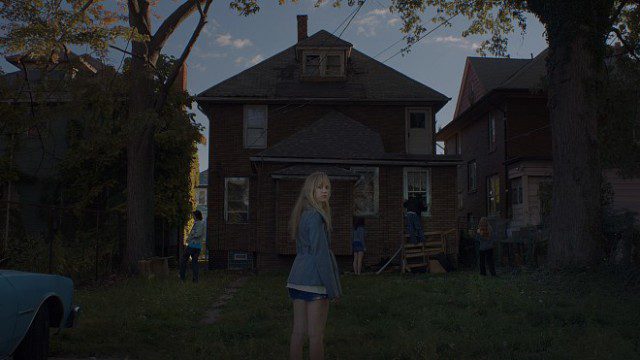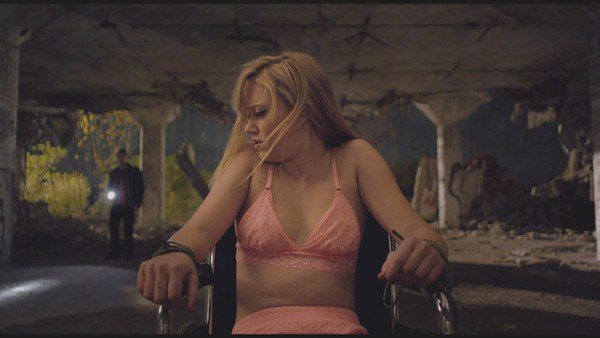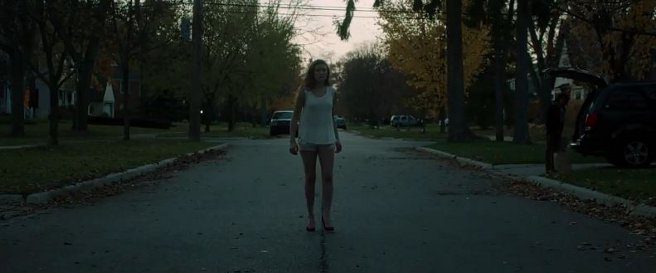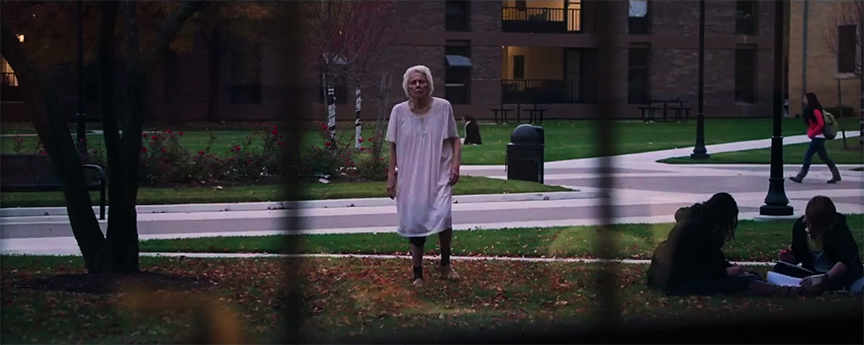It’s not overstating things by that much to say that comedies should be measured most decisively by how frequently and hard they make you laugh, action movies by their excitement factor, and horror films by how difficult they would be to watch by yourself. The most terrifying can ink into your psyche in ways that make them chilling to even think about, let alone watch in an empty house. I feel safe declaring that I could view It Follows by myself someday—and far sooner than I ever could say, The Babadook. The latter, which was just months ago rightly named by quite a few (including by William Friedkin himself) as one of the scariest films in years (or maybe ever), was a psychological horror-thriller about depression with a disturbing depiction of motherhood that cast an evil spell like few others.
The amply buzzed about It Follows is being greeted with similar accolades for its frights (though only with horror movies does praise sound almost cautionary), including an extremely glowing piece by Todd VanDerWerff in Vox calling it “the scariest American horror movie in years”, but it’s not anywhere near as viscerally nerve-rattling. I question whether it will haunt many dreams. And yet despite a couple missteps which hamper some of its effectiveness as a scary movie, it’s still good sinister fun and a stylistic tour-de-force that’s definitely worth checking out.
David Robert Mitchell, who wrote and directed, doesn’t waste a microsecond in racheting up the dread and terror. The movie begins immediately with the sight of an open suburban residential street in the that could be anywhere (it’s set in Detroit, Michigan) just before the very last of the day’s sunlight tapers off. It’s not more than a few moments before a young woman run out of her house into the middle of the road as the camera knowingly follows her step for step. What’s she running from? It’s not at all clear. But by the time she flees to the lake at night (rendered in a stunning shot of her bathed in the light of her car’s headlights) and starts making panicked phone calls we realize as much as she does that death is imminent and unavoidable. By the next morning fate has delivered: she’s a mangled, bloody corpse with one of her legs literally twisted around.
From that stark, chilling opening the movie ably segues into the seemingly disconnected lives of a couple kids straight out of high school who exist in that weird limbo phase between graduation and moving out where you still live with your parents and are still bound by some rules. An attractive girl named Jay with brown eyes and blonde bangs (she’s played by Maika Monroe) goes on a date to the movies with a slightly older guy named Hugh (played by Jake Weary, he looks like the type who would disappoint a young lady’s parents more than outrage them). They play an innocent game of trading places where one person picks two people in the general area they would swap lives with and the other person has to guess who they are. When he points to someone Jay is unable to see, he becomes suddenly mortified. They promptly leave the theater before the movie’s even begun.
The rest of the date appears to go better after the bizarreness of their exit. They go out again shortly thereafter and end the night by having sex in the cramped backseat of his car. When it’s done he switches gears rapidly and ties her up. While she sits bound in her pink undergarments Hugh explains about how a one-night stand has left him stalked by strange demonic forces who intend to destroy him. These figures can take the form of loved ones, they can be outrun, but they are always coming. The only way he can save his own hide is to have sex and pass on the curse. Jay can spare herself by doing the same. “Sleep with someone as fast as you can,” he urges her.
Without being overly nasty or oppressive, those scenes have the sleek, surreal flow of a very bad dream that you could swear actually happened. When she wakes up the next morning with the full knowledge that it really did happen, Mitchell doesn’t really play up that queasy moral dilemma of who she’ll intentionally pass the curse onto (we never get the sense that’s what she’s aiming to do–in fact, quite the opposite). When she finally hunts down Hugh she learns that it wouldn’t solve anything anyway as he’s still chased as much as she is. All she can do is keep looking over her shoulder at all times and try to escape the weird entities that only she can see.
It Follows is only Mitchell’s second full-length feature film (the first was The Myth of the American Sleepover). Put plainly, he directs the hell out of this. He’s a whiz at panning and switching to long shots that make us ever feel the voyeur and suggest incredible danger for the characters. In one scene the camera zooms in on Jay’s crimson red finger nails as she fidgets with some wild flowers and tonally the moment shifts from something utterly innocuous to having a phenomenally vicious menace.
He has a good eye for composition throughout too. I saw one interview where the writer asked about the timeless quality of the picture, noting that it doesn’t seem anchored to any specific era (though it’s clearly meant to be set more or less in the present day—despite the anachronism of teens using a landline phone). Having travelled recently through Detroit, I can attest that’s exactly what it’s like there now. Mitchell, a Michigan native, uses that Midwestern setting very well: many shots seem attuned to the moody, grayly ominous atmosphere. At one point it rains and the black clouds look more like smoke from an industrial factory than actual clouds.
Mitchell is clearly a filmmaker who has ingested much Hithcock and De Palma. He’s surely well-studied on movies like Halloween and Blue Velvet too. It Follows may be a metaphor for sexually transmitted disease generally-or the terrible things the genders do to each other more specifically-but what it never plays like is a cautionary, moralizing story about promiscuous young people. In that sense it’s less of a serious, straight horror film and more of a self-consciously-and expertly-stylized knowing genre exercise.
He certainly gets the rhythms right, knowing when to tease and when to throw genuine terror at the audience. His tongue in cheek scares are perfectly placed (the best is when Jay examines her private areas after her night with Hugh and a ball hits the bathroom window with the hardest of thuds but it’s-much to her relief-only a ball). Another thing he has is the strange dislocation from pure reality: people are shot or die without the constant intrusion of law enforcement or much reflection by the other characters.
For all the auteur wizardry and its ghostly, radical score (Rich Vreeland recording as Disasterpeace), It Follows can feel aimless. After being cursed, Jay joins her sister and the neighbor who’s always been in love with her and is supremely jealous of the guys who have been with her (a gaunt and solemnly nerdish Keir Gilchrist) at a summerhouse, which is of course no escape. Subsequent that the excitement and tension doesn’t leak out completely, but the movie does start to seem less focused. It begins decisively better than it ends and you get the feeling much of what you’re seeing is as much for the rhyme of it as the meaning.
The single biggest mistake made along the way is in the presentation of the humanoid demons. Only one or two of them are actually scary. The rest are just somewhat lobotomized looking people with a dogged determination to do great harm. This is, of course, in and of itself frightening–enough so that showing them as much as Mitchell does was unnecessary and even self-defeating. Apart from the stunning opening sequence, the two creepiest scenes play off the fact that only Jay can see them-and showing her reaction and the mayhem unleashed from the perspective of her friends-to brilliant effect.
However, with both scenes the strategic minimalism is quickly dispensed with to show us more and more of them. It eventually feels like excess. And when one of them appears on the roof stark naked midday seemingly just to taunt, it borders on silly. It Follows is stylish and hip enough to be this year’s Let the Right One In as much it could fill the void of a Paranormal Activity type feature. One could easily see this becoming a cult classic and it’s probably well on its way already. But even more than the horror films it’s keenly aware of, the movie is vastly scarier for what it unnervingly suggests than what it actually shows.





